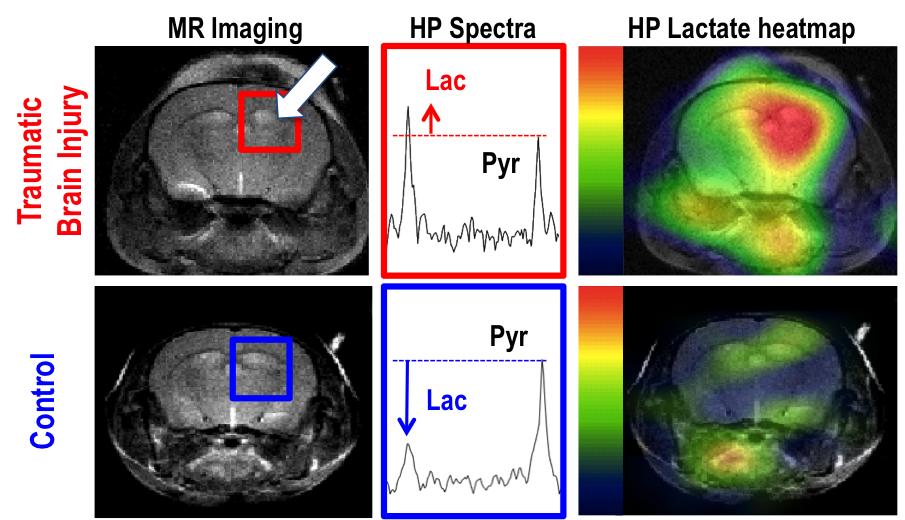UCSF’s Myriam M. Chaumeil Receives Prestigious Cal-BRAIN Grant
 The California Blueprint for Research to Advance Innovations in Neuroscience (Cal-BRAIN), a neurotechnology program in California aimed at innovations applicable to the full spectrum of brain disorders, recently awarded the team of UCSF Department of Radiology and Biomedical Imaging team lead by Myriam M. Chaumeil, PhD, a prestigious grant for their work "In vivo Metabolic Imaging of Neuroinflammation using Hyperpolarized 13C".
The California Blueprint for Research to Advance Innovations in Neuroscience (Cal-BRAIN), a neurotechnology program in California aimed at innovations applicable to the full spectrum of brain disorders, recently awarded the team of UCSF Department of Radiology and Biomedical Imaging team lead by Myriam M. Chaumeil, PhD, a prestigious grant for their work "In vivo Metabolic Imaging of Neuroinflammation using Hyperpolarized 13C".
“Hyperpolarized 13C Magnetic Resonance Spectroscopic Imaging provides unique information on the brain metabolic function, in physiological and pathological states,” notes Dr. Chaumeil. “With this project we believe we will better visualize neuroinflammation non-invasively.”
Hyperpolarized (HP) 13C MR Spectroscopic Imaging (MRSI) is a non-ionizing, non-radioactive “real-time” imaging method that can be used safely in longitudinal studies. Over the last few years, this powerful technique has been used for cancer research, pre-clinically and in clinical trials, allowing for improved diagnosis, evaluation of tumor grade and assessment of therapy outcome.
With this research, Dr. Chaumeil and team-members Sabrina Ronen, PhD, Katerina Akassoglou, PhD and Susanna Rosi, PhD, propose to expand the use of hyperpolarized13C Magnetic Resonance Spectroscopy Imaging (MRSI) to the study of neuroinflammation in vivo, for the first time. This technique will help identify new biomarkers that could dramatically improve the understanding of several brain diseases, including Traumatic Brain Injury, Multiple Sclerosis, and other cerebral diseases.

Upon clinical translation, the neuroimaging methods developed in this project could have a major impact on clinical practice. They could improve diagnosis and monitoring of response to innovative therapeutic approaches, which would help refine therapeutic regimens and, ultimately, lead to better clinical outcome and patient quality of life.
The mission of Cal-BRAIN is to advance new technologies to revolutionize the understanding of the brain in health and disease by improving the ability to monitor and analyze brain activity. To achieve this goal, Cal-BRAIN has established a coordinated statewide program to award research grants and support, and to integrate the search for and development of new technologies capable of monitoring wide-scale brain activity.
Dr. Chaumeil’s project is just one of sixteen proposals – out of 126 submissions – funded by Cal-BRAIN based on scientific quality, significance, innovation and scalability. Cal-BRAIN’s 2015 Awards funding includes sixteen awards of $120,000 each to 13 different institutions. The funded projects cover four different aspects of the brain’s activity: electrical activity, neurochemical activity, metabolic activity, and gene activity. The technological strategies include advances in microscopy, brain imaging, sensors based on nanotechnology, and neural prosthetics.
